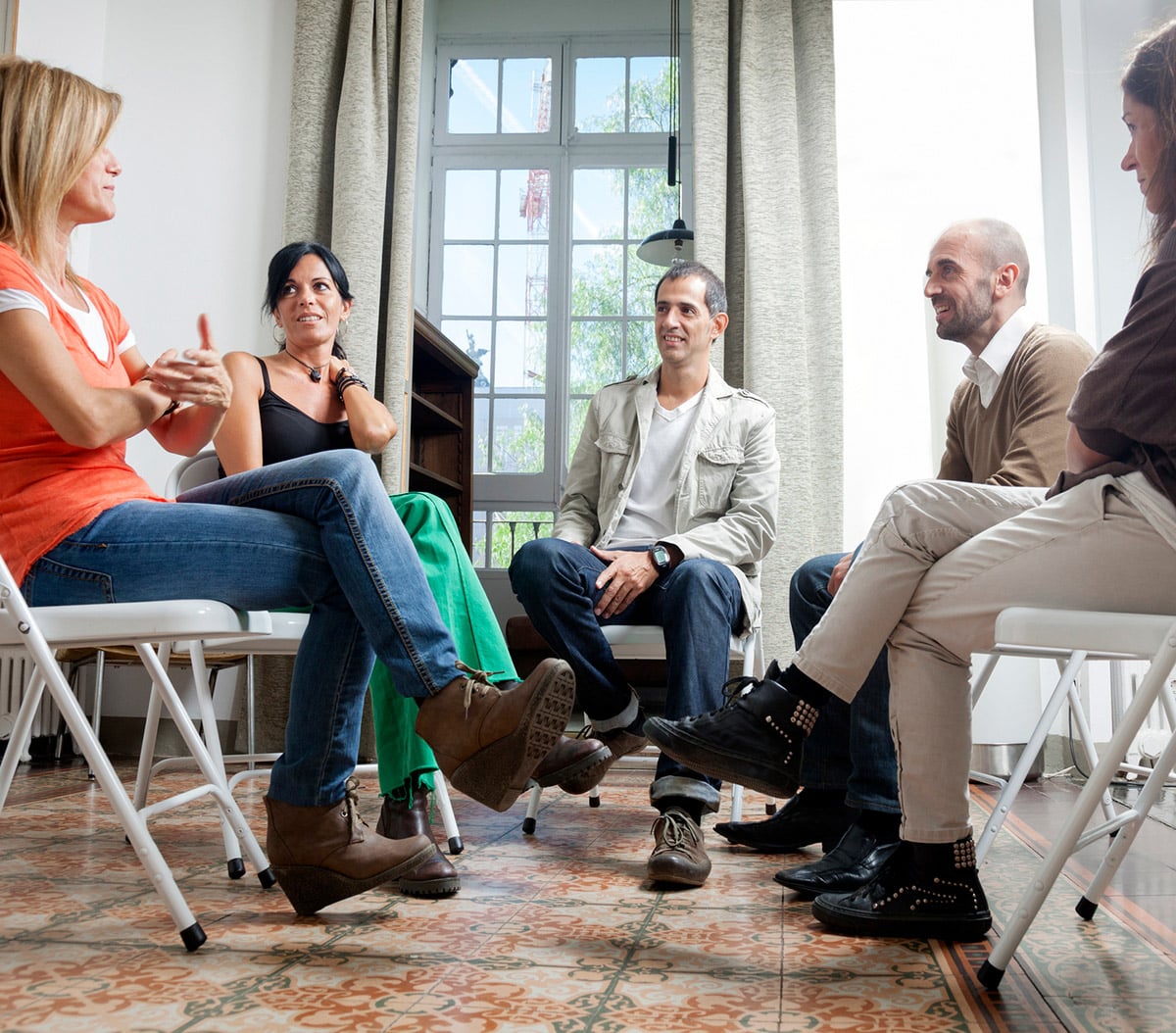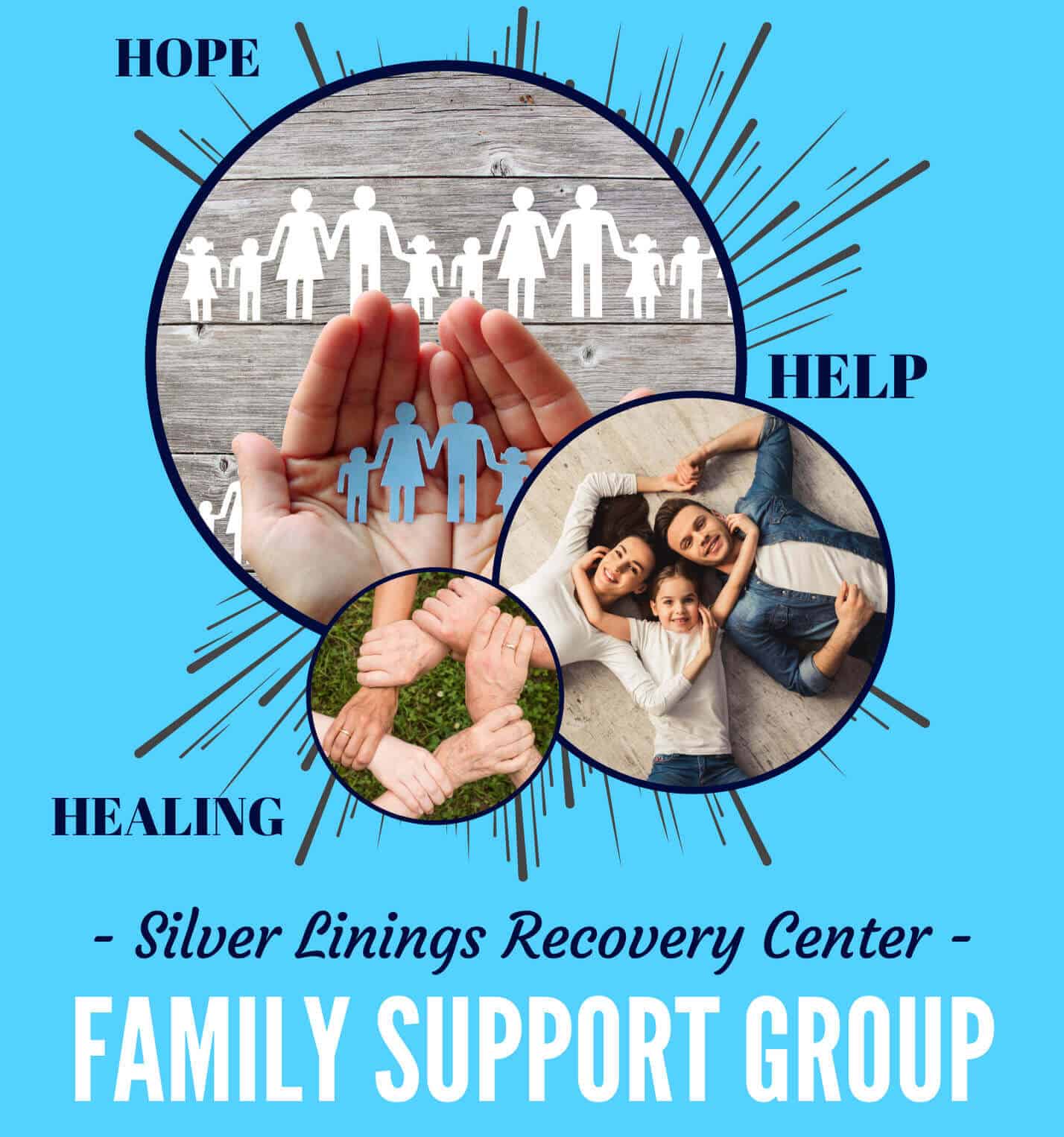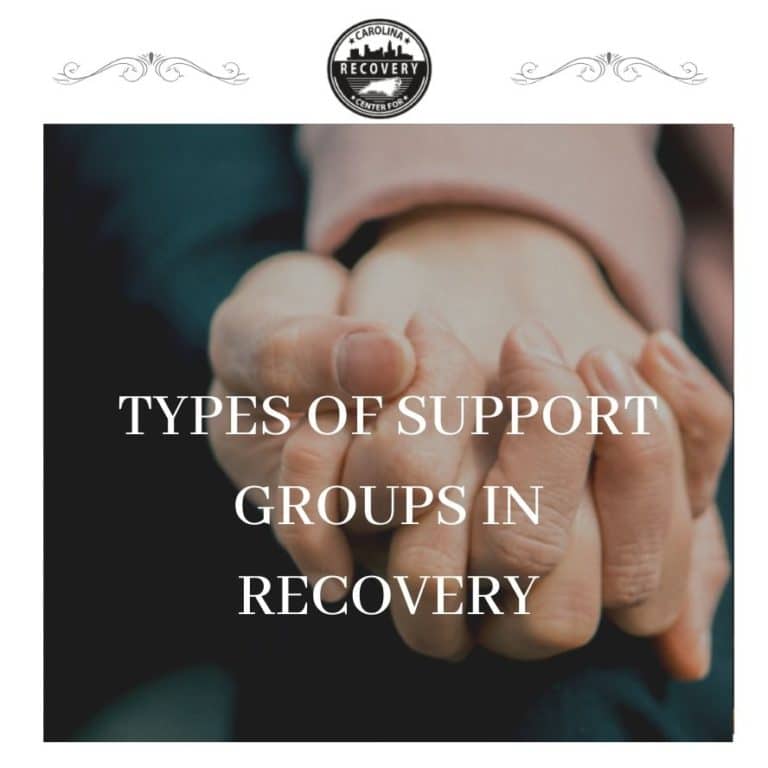What Is The Difference Between Addiction Support Groups And Group Therapy
In support groups for addiction, people who are dealing with the same type of addiction meet to share experiences, validate one another in an atmosphere of openness and respect, and ask questions and discuss issues in a way that is free of judgement. Recovering addicts can use this community as a tool for discovering or continuing along their own self-directed, recovery path. There may be a peer counselor or group leader who facilitates the meeting, but everyone in the room has equal potential to be a teacher. Meetings are kept confidential by members, and members are encouraged to develop relationships of mutual support outside the meeting space. No records are kept, and meetings are always free.
Group therapy is a therapeutic tool designed to help group members address addiction and mental health concerns in conjunction with others who need help with similar issues. Therapy groups are led by professional counselors, therapists, psychiatrists or psychologists who guide the proceedings and keep records following professional health system guidelines. While support groups are more oriented towards mutual validation, group psychotherapy is sometimes deliberately confrontational, to help members honestly address and work through their issues. Group therapy is a professional psychiatric service that is billed to insurance providers, and are similar to private therapy sessions, but in a group environment.
Ways To Get In Contact With Us
If you believe you or someone you love may be struggling with addiction, let us hear your story and help you determine a path to treatment.
There are a variety of confidential, free, and no obligation ways to get in contact with us to learn more about treatment.
Parents Of Addicted Loved Ones
Parents of Addicted Loved Ones is a Christian-run non-profit based on one founding phrase: People helping people through the woods. PAL meetings are usually held weekly and provide support for parents who have children addicted to drugs or alcohol. PAL groups are run by peers and consist of both an educational and a sharing component.
Don’t Miss: How To Know If You Have An Addictive Personality
Family Addiction Treatment Programs
Family involvement is essential for the recovery process. If you have a loved one living with addiction, the sooner you get involved and seek support for yourself, the better. If your loved one is attending treatment at one of the many Recovery Village facilities across the country, The Recovery Village Family Program is a great place to start. Reach out to a representative for more information or visit our webpage today.
Group Therapy At New Directions For Women

At New Directions for Women, we offer group therapy as part of our comprehensive addiction treatment programs. Here at our facility, group therapy topics for addiction treatment focus on the needs of the individuals within our rehab community.
Our groups are led by experienced therapists who specialize in addiction and recovery. With the primary goal of providing a safe and supportive environment, we ensure that your experience in our group therapy sessions will aid you in your journey to sobriety. Addiction group topics in our group counseling will allow you to receive the support and guidance you need.
If you or a woman close to you is struggling with substance abuse, drug addiction, or alcoholism, please dont hesitate to reach out to us. We offer a variety of addiction treatment services, including group therapy, individualized treatment plans, and more. Contact us today to learn about our many treatment programs and how we can help you start healing today.
Read Also: How To Treat Xanax Addiction
Read Also: Group Topics For Addiction Recovery
Common Addiction Group Topics
The topics covered in group therapy focus on a range of issues that are common during addiction. This can include anything from groups about self-care to process groups. Some of the common addiction group therapy topics that are typically covered in these groups include:
- Developing healthy habits to promote recovery
- How to manage withdrawal symptoms and cravings
- Understanding addiction and how it affects the individual
- Identifying addiction triggers and learning how to avoid them
- Coping with the stress and emotional turmoil that often accompanies addiction
- Seeking additional support from family members and friends during addiction
Often, people are uncomfortable with the idea of sharing in a group setting. Talking to strangers about your inner thoughts or about issues in your life can seem daunting. However, addiction group therapy provides a unique opportunity to learn from others who are also facing addiction.
Group counseling for addiction offers people the opportunity to gain insight and understanding, and to develop healthy coping mechanisms. It may be helpful to learn more about the different addiction group topics and how they benefit members of group therapy.
Finding Help In Addiction Treatment
If you approach them correctly, substance abuse group activities have plenty of positive benefits for those involved. Do you know someone who needs the assistance of group therapy or addiction treatment? Call Hawaii Island Recovery, a facility located on the Big Island specializing in treatment for addiction, alcoholism, mental illness, and dual diagnosis. Reach our admissions office today at .
Recommended Reading: How To Get Out Of Addiction
Support Groups Can Teach You New Skills
The wide variety of people you encounter in addiction support groups creates a rich pool of experience to draw from. Almost every group member will have a toolbox of coping skills that they have learned from trial and error throughout their recovery, and they can pass along what theyve learned to you. Sometimes just hearing about other peoples experiences can teach you by example.
Self Help And Support Groups
Many find it helpful to join a self-help or support group for friends, families, and loved ones of individuals struggling with an addiction or in recovery. These mutual assistance groups are typically free and based on shared personal experiences rather than professional, fee-based services, like counselors or therapists.
Some notable mutual assistance groups are:
Alcohol and/or Narcotics
Recommended Reading: Office Of Addiction Services And Supports
Finding Addiction & Mental Health Support Groups
Support groups can now be found by phone, online and in person. SAMHSA provides different ways to find help with alcohol and drug addictions and associated mental health problems. Its national helpline can be reached at 1-800-662-HELP . The round-the-clock helpline offers information and treatment referrals. The service is confidential and free. It can be used by people battling addiction and their family members.
Other helpful phone numbers include:
- National Drug Helpline: 1-888-633-3239
- National Suicide Prevention Lifeline: 1-800-273-TALK
- Veterans Crisis Line: 1-800-273-8255 or text 838255
- Disaster Distress Helpline : 1-800-985-5990
- 1-888-843-4564**Available Monday-Friday, 4 p.m. to 12 a.m. EST and Saturday, 12 p.m. to 5 p.m.
- Your Life Your Voice Hotline : 1-800-448-3000 or text VOICE to 20121**Available 12 p.m. to 12 a.m. CST)
- Caregiver Support Line: 1-855-260-3274
In the event of an emergency such as an overdose always call 911.
SAMHSAs online Behavioral Health Treatment Services Locator can also help people find nearby addiction and mental health treatment facilities located in the U.S. and U.S. territories.
Other helpful websites include:
- NIAAA Alcohol Treatment Navigator: provides information on treatment options and how to choose the right program or support group for yourself or a family member
- Medication-Assisted Treatment : for substance abuse disorders including opioid addictions
Recovery Support Groups For Addiction: One Size Does Not Fit All
After completing treatment for drug or alcohol addiction whether or not its upon discharge from a residential treatment facility or while attending counseling or an outpatient program most people are encouraged to join a support group to help maintain recovery. If your son or daughter finds themselves in this position, regular attendance at support group meetings can provide structure to create a new daily routine, and it can offer interaction with like-minded people and a chance to feel connected rather than isolated. Support groups can be a safe space away from certain triggers and offer the opportunity to learn new, healthier coping skills from others.
There are a variety of support groups to choose from, but just as with substance use treatment, there is no one-size-fits-all solution. It may be helpful to encourage your son or daughter to try out different groups in order to find the best fit. And keep in mind that since groups are peer-led, each one can feel a bit different even if they are affiliated with the same overall program.
Also Check: How Long Does It Take To Get Addicted To Meth
Most Of All Addiction Support Groups Help Prevent Relapse
Addiction is a chronic disease, and those recovering from it are vulnerable to relapse. Every reason on this list adds up to the main fact that support groups for addiction are a resource that can keep you from relapsing and returning to substance abuseand if you do happen to relapse, the compassionate acceptance and assistance offered by support groups will be there to help you get back on track, and stay on track, stronger than before.
Select a state to find options for rehab centers in your area.
Effective Types Of Treatment

When looking for a treatment program, remember that there is no single answer to recovery. You are a unique individual, and your addiction may be tied to a lot of unique factors. The most effective type of treatment for you is the one that takes your personal needs into account and meet them in innovative ways.
When looking for a treatment program, remember that there is no single answer to recovery. According to the National Institute of Drug Abuse , the most effective treatment programs combine medicine and therapy. Effective programs use medication to help wean you off of drugs or alcohol, and then they treat you using therapy and other tools until you reach sobriety. Throughout these rehab programs, you will learn how to live your life without drugs and alcohol. Once you have completed one of these programs, you may want to join a support group to help you maintain your life without drugs or alcohol.
Recommended Reading: How Can I Get Rid Of My Porn Addiction
How Does Ocean Recovery Use Group Therapy
Ocean Recovery uses group therapy in a combination with individual therapy and other holistic therapies. With these therapies, alongside engaging in social activities, drug detox and alcohol detox, we provide a comprehensive approach to addiction treatment that is effective and provides the best chance of long-term recovery.
Beyond rehab we provide a free 12-month aftercare package that makes heavy use of group therapy and 12-step programs. We encourage you to attend support meetings so that you stay on the right path and achieve your sobriety goals.
Adult Children Of Alcoholics
The Adult Children of Alcoholics World Service Organization is an organization that offers advice and resources for anyone who grew up with alcoholics.
It’s known for “The Laundry List,” a list of traits familiar to anyone who grew up in an alcoholic home. Tony A.’s “‘Other’ List” lists some common traits among adult children of alcoholics.
Don’t Miss: Weight Loss For Food Addicts
What Are Peer Support Groups
Peer support groups are simply meetings of people who struggle with similar addictions. These groups may be composed of individuals of all ages and genders, or they may be listed for a more narrow demographic. You and your peers will get to know one another by sharing stories, listening to one another, and honoring the difficulties that each of you has faced as you work to overcome your addictions.
The Importance Of Addiction Group Topics
The importance of talking about addiction group topics in a group setting is to heal as a group. Talking among your peers in a group setting helps heal wounds. Advice among your peers can prove helpful. Whatever addiction treatment for group therapy that is chosen will help you get closer to your goals. Treatment is necessary to see your goals come to fruition. Getting help with addiction through group therapy is a great way to begin your treatment.
Group therapy helps patients to endure and nurture their feelings. Group therapy is a great way to help develop their interpersonal skills. They help with maintaining healthy relationships. Group therapy often helps with a feeling of loneliness. In a group setting, patients get their strength from other individuals within their group going through similar circumstances. The variety of addiction group topics brings a more personalized approach to the healing process. It also helps them feel like they are not alone.
If you are struggling with addiction or have a loved one that is struggling with addiction contact us. You can call us at 433-1101 for all your addiction recovery needs.
References
Don’t Miss: How To Stop Mastur Addiction In One Day
Having A Loved One Living With Addiction Can Be Difficult Fortunately Many Support Groups Are Available For The Friends And Family Members Of People With Substance Use Disorders
One of the most important factors in drug or alcohol treatment is the strength of the support system around the person in need of help. If youre a family member of someone undergoing treatment for drug or alcohol addiction, you can have an enormous impact on their recovery by showing them that you are available and supportive.
However, because a loved ones addiction can be emotionally taxing, family members dont always have the resources or energy to provide this crucial support. In these cases, several organizations can help families in need, including Al-Anon, Alateen, Nar-Anon, Parents of Addicted Loved Ones, Families Anonymous, SMART Recovery Family & Friends and NAMI Family Support Groups.
How To Join A Support Group
For most support groups, all that is required to join is a desire to begin recovery. Most people join a support group by simply walking in the door of a meeting near them. No invitation is required and there are no dues or fees. For members, there is often a voluntary collection.
That said, there are “open” meetings for members and non-members as well as closed meetings for members and prospective members only. Depending on the type of meeting, you might come across some of the following codes that indicate a more exclusive support group or additional services offered:
- American Sign Language
- Al-Anon Family Groups from Al-Anon
You can still find a meeting the old-school way by looking up a phone number in the white pages of the local telephone book or online.
Some databases are detailed and allow you to see which meetings are for newcomers or are wheelchair accessible, non-smoking, or LGBTQ+-friendly, among other characteristics. Other pages are less detailed and may only have phone numbers or listings for you to contact the meeting organizers.
The following is a list of official mutual support group websites and their meeting listings. If you cannot locate a face-to-face meeting near you, there are many online meetings available.
Don’t Miss: Opioid Addiction And Dependence Drug Detoxification
Addiction Recovery Group Activities
Addictions Content Team
Our Addictions Content Team has been providing up to date information on substance use disorders, and co-occurring disorders for over a decade. Each piece of content is reviewed by our team of medical experts, consisting of doctors, registered nurses, and licensed therapists, as well as by our editorial staff.
Fast, Free & Confidential Help Is Available 24/7.
- Access to the Best Rehab Centers
- 24 Hour Support when YOU need it
- Financial Assistance Programs
Recovery support groups are wonderful tools for achieving and maintaining successful, long-term addiction recovery. They are a form of group therapy that is available free of charge all over the world, with no membership requirements other than the desire to lead a life free of substance abuse.
These groups support recovery by providing a judgment-free environment where members can show acceptance and offer validation. Through honest, confidential discussion, recovery groups allow members to learn from one anothers experiences, vent and explore feelings that might otherwise reach a crisis point, and give and receive feedback on individual situations and challenges. They are a form of addiction recovery treatment that is offered from peer to peer so that members have the comfort of knowing that everyone involved has an intimate understanding of what it is like to have and recover from addiction.
Do I Need Health Insurance To Receive This Service

The referral service is free of charge. If you have no insurance or are underinsured, we will refer you to your state office, which is responsible for state-funded treatment programs. In addition, we can often refer you to facilities that charge on a sliding fee scale or accept Medicare or Medicaid. If you have health insurance, you are encouraged to contact your insurer for a list of participating health care providers and facilities.
Recommended Reading: How To Overcome Weed Addiction
Benefits Of Peer Support Groups In The Treatment Of Addiction
You may wonder why you should consider joining a support group if you already have a strong support system in your family or social circle. While having the encouragement of loved ones can be very helpful when starting your recovery process, these individuals unless they have struggled with addiction themselves may not understand the nuances of what youre going through. Joining a peer support group in addition to the supports you already have in place can include the following benefits:
- Peer support can help protect you against life stressors that arise that trigger your desire to drink or use your drug of choice
- Peer support gives you a new social network that is based around one common goal: getting and staying sober
- Peer support is an important part of outpatient treatment programs in which patients do not live together in a residential facility
